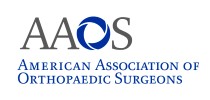 You are entering webpages belonging to the American Association of Orthopaedic Surgeons, which includes information and resources for Association advocacy efforts and the Political Action Committee of The American Association of Orthopaedic Surgeons (OrthoPAC).
You are entering webpages belonging to the American Association of Orthopaedic Surgeons, which includes information and resources for Association advocacy efforts and the Political Action Committee of The American Association of Orthopaedic Surgeons (OrthoPAC).
The AAOS believes Health Information Technology (HIT) should strive to improve quality care - not detract time and attention from the care of patients - and that access to and
AAOS believes that health information technology (health IT) should strive to improve quality care and not detract time and attention from the care of patients. The current health IT landscape has changed dramatically since the Electronic Health Record (EHR) Incentive Programs (now Promoting Interoperability Programs) were first established in 2011. Adoption is now widespread. As of 2017, the Office of the National Coordinator (ONC) for Health IT found that 86% of office-based physicians had adopted an EHR, and 96% of all non-federal acute care hospitals possessed certified health IT.[1] ONC has issued its most recent 2015 edition certified electronic health record technology (CEHRT), and in 2019 this became required for hospitals interested in meeting Promoting Interoperability program requirements.
The exponential growth of EHR use among providers has not come without costs. A 2018 study found that stress from using EHRs among physicians is common and was independently predictive of burnout symptoms.[2] A 2016 study also found that for every hour of direct clinical time with patients, physicians spent two additional hours on EHR and desk work, and an additional one to two hours of after-hours personal time completing documentation and EHR tasks.[3] Improving user design and providing greater regulatory flexibilities for EHR products, can help to mitigate many of these issues. Improvements must reduce provider burden and focus on improving the provision of patient care.
A greater focus has also been centered on achieving interoperability for health IT applications. Interoperability should not focus simply on the electronic sending, receiving, finding, integrating, and use of data from outside sources. True interoperability must allow the exchange and use of information to be secure, useful, and valuable to the patient and the provider. AAOS is committed to ensuring that health IT is designed to reduce provider burden and improve patient care.
[1] https://dashboard.healthit.gov/quickstats/quickstats.php
[2] Rebekah L Gardner, Emily Cooper, Jacqueline Haskell, Daniel A Harris, Sara Poplau, Philip J Kroth, Mark Linzer;
Physician stress and burnout: the impact of health information technology, Journal of the American Medical
Informatics Association, ocy145, https://doi.org/10.1093/jamia/ocy145
[3] Hingle S. Electronic Health Records: An Unfulfilled Promise and a Call to Action. Ann Intern Med. ;165:818–819.
doi: 10.7326/M16-1757